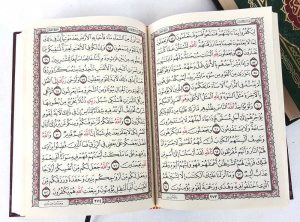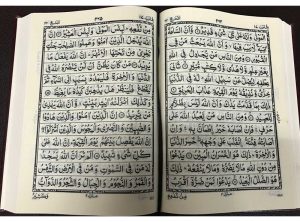Open Recitation
The participant will be required to recite a set of verses from the part of the Holy Qur’an (randomly selected by the participant). Depending on the speed and quality of the recitation the judges will decide how much the participant would recite, up to a maximum of 2 pages (Uthman Taha script).
The participant will be required to recite a set of verses from the part of the Holy Qur’an (randomly selected by the participant). Depending on the speed and quality of the recitation the judges will decide how much the participant would recite, up to a maximum of 2 pages (Uthman Taha script).
Hifdh
For participants will be asked to give a short description and learning of the Surah they are being asked to recite. This is to encourage a better understanding of the Qur’an
The participant is expected to memorise all of the chapters or verses given below. On the day, the participant will be asked to start reciting from anywhere. The judges will initiate by reciting a verse or the end of a previous verse, the participant should then continue until the end of the chapter or is asked to stop. The starting point may or may not be from the beginning of the chapter. For smaller chapters, participants may be expected to complete
the recitation of the entire chapter/s.
To encourage better understanding of the Qur’an, this year the participants will also be required to give a short summary (maximum of 1 minute) of the overall meaning or message of the chapter or verses they are tested on.
For example, if the participant is asked to recite Surah Asr they may say: “This Surah is about time which is so precious to humans.
Allah (SWT) tells us that time is running out and unless we do good deeds, tell the truth and be patient we are losing. I have learnt from this Surah that we have to be responsible for time and not waste it. Also that when I don’t get something I should be patient.”
Tafseer
Participants will be given verses or a small chapter to research and prepare for in advance. They are able to use any reference material to prepare as long as they are able to quote the source of their research if asked.
Participants should research and prepare the verses below in advance. They are able to use any reference material to prepare as long as they are able to quote the source of their research if asked. Recommended tafaseer references are provided later in this information pack.
On the day, each participant will be given an allocated time to provide a general explanation of the verses below. The judges will then question the participant based on some or all of the verses or things that have been mentioned by the participant in their presentation.
Participants can quote and refer to a tafseer in any language. The judges are able to read out the verses in Arabic and/or English (once) before the participant starts.
Participants will be allowed to bring written one page of notes, up to a maximum of one side of A4, to support them in their presentation. If more than 1 sheet of A4 is brought to the testing, participants will be asked to remove them and only choose 1 sheet to keep with them.
Participants will also have access to a copy of the Holy Qur’an (in Arabic) for reference.
Participants should research and prepare for both groups of verses listed below in advance.
They are able to use any reference material to prepare as long as they are able to quote the source of their research if asked. Participants can quote and refer to a tafseer in any language.
On the day, each participant will be given an allocated time to provide a general explanation of one of the groups of verses below. Which group of verses is tested will be chosen at random. If a participant would prefer to be tested on the other group of verses (i.e. the one that has not been chosen at random), they can do so but will lose 10 marks from the overall score.
The judges are able to read out the verses in Arabic and/or English (once) before the participant starts. Once the participant has used their allotted time to make their opening presentation, the judges will then question the participant based on some or all of the verses or things that have been mentioned by the participant in their presentation.
Participants will be allowed to bring written one page of notes, up to a maximum of one side of A4, to support them in their presentation. If more than 1 sheet of A4 is brought to the testing, participants will be asked to remove them and only choose 1 sheet to keep with them.
Participants will also have access to a copy of the Holy Qur’an (in Arabic) for reference.
This year’s tafseer competition for 16+ will be split into three categories. Please see details below.
Participants should research and prepare for all of the verses listed below in advance. They are able to use any reference material to prepare as long as they are able to quote the source of their research if asked. Participants can quote and refer to a tafseer in any language.
On the day, each participant will be given an allocated time to provide a general explanation of 2 verses. One of these verses will be selected at random and one of these verses will be chosen by the participant. For intermediate participants ONLY ONE Verse will be used and this will be selected at random. If the participant would prefer to present a different verse to the one drawn at random, they can request the selection be redrawn, up to a maximum of two times. Every time they ask to redraw, they will have a 10 mark deduction
from their total score.
After completing their opening explanation / presentation, the judges will then question the participant based on things that have been mentioned by the participant in their presentation.
The judges are able to read out the verses in Arabic and/or English (once) before the participant starts.
Participants will be allowed to bring written one page of notes, up to a maximum of one side of A4, to support them in their presentation. If more than 1 sheet of A4 is brought to the testing, participants will be asked to remove them and only choose 1 sheet to keep with them.
Participants will also have access to a copy of the Holy Qur’an (in Arabic) for reference.



